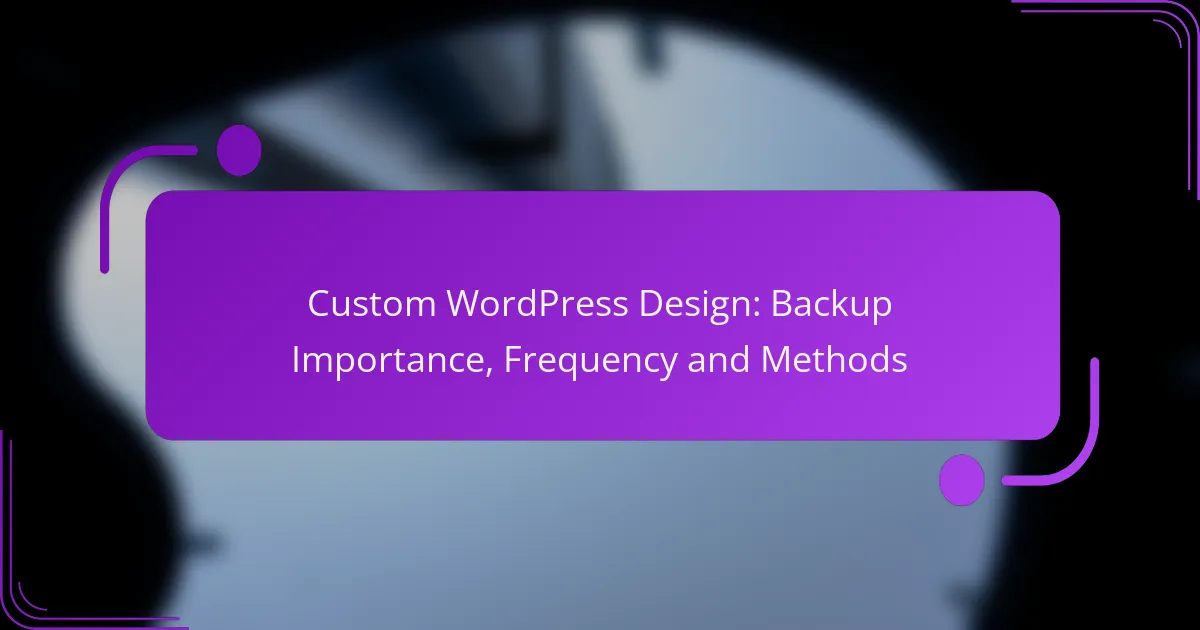Backing up your WordPress site is essential for safeguarding your content and ensuring seamless business operations. The frequency of backups should align with your site’s activity level, while various methods—ranging from manual backups to automated solutions—offer flexibility to suit your technical expertise and needs.
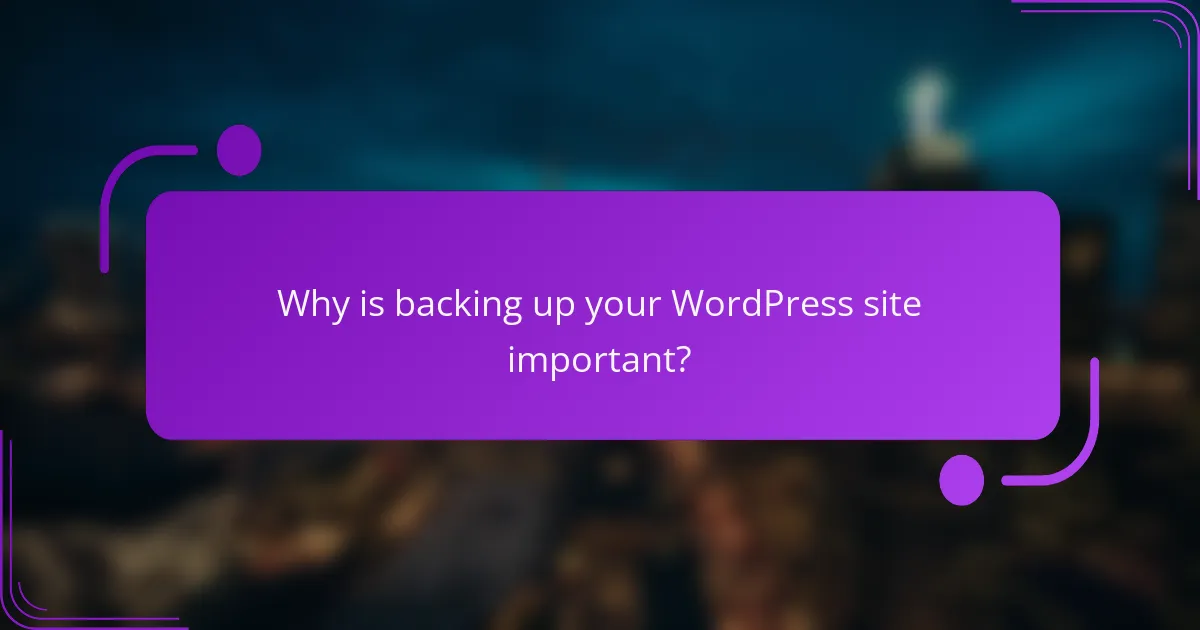
Why is backing up your WordPress site important?
Backing up your WordPress site is crucial for protecting your content and ensuring business continuity. Regular backups safeguard against data loss, enable quick recovery from issues, and help maintain the overall integrity of your website.
Prevents data loss
Data loss can occur due to various reasons, including server failures, accidental deletions, or software errors. By maintaining regular backups, you can restore your site to a previous state, minimizing the impact of such incidents.
Consider implementing a backup schedule that aligns with your content update frequency. For example, if you publish new posts weekly, a weekly backup may suffice, while daily backups might be necessary for e-commerce sites with frequent transactions.
Ensures quick recovery
In the event of a website crash or data corruption, having recent backups allows for swift recovery. This minimizes downtime, which is critical for maintaining user trust and search engine rankings.
Choose a backup solution that supports one-click restoration to streamline the recovery process. This feature can significantly reduce the time needed to get your site back online, often to just a few minutes.
Protects against hacks
Cybersecurity threats are a constant concern for website owners. Regular backups serve as a safety net, allowing you to restore your site to a secure version if it becomes compromised.
To enhance security, consider using plugins that automatically back up your site after updates or changes. This ensures that you always have a recent version to revert to in case of a hack.
Maintains website integrity
Backups help maintain the integrity of your website by preserving its structure, design, and content. This is especially important when making significant changes or updates.
Utilize a version control system alongside backups to track changes over time. This allows you to identify and revert specific changes that may have negatively impacted your site, ensuring a seamless user experience.
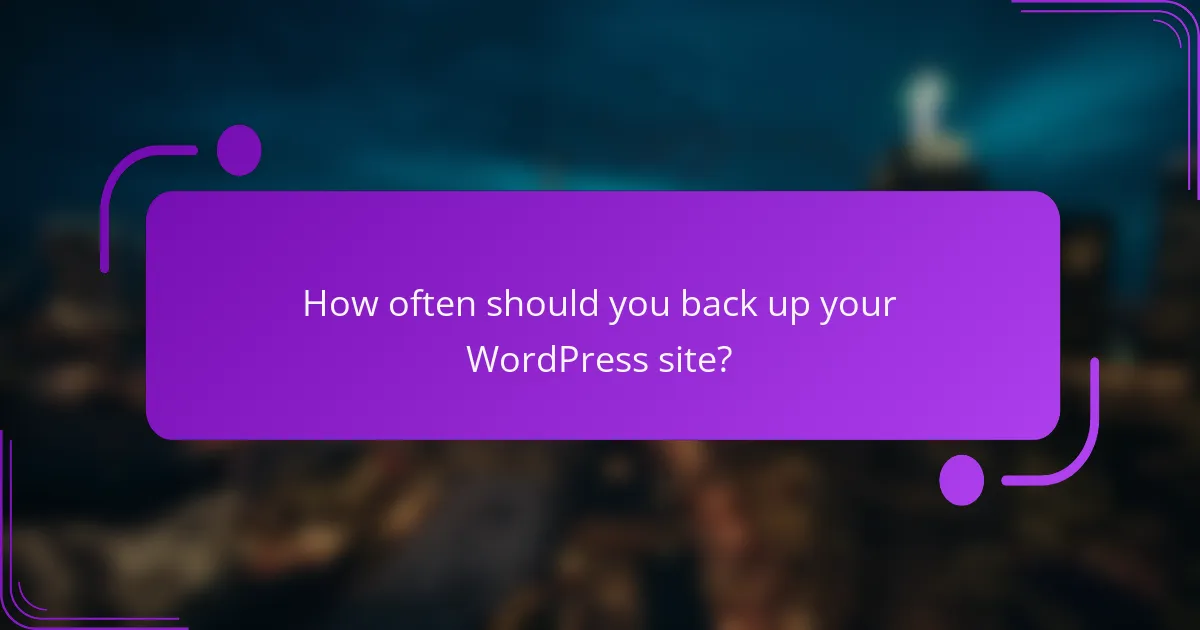
How often should you back up your WordPress site?
You should back up your WordPress site regularly to protect against data loss. The frequency of backups depends on how active your site is and the nature of its content.
Daily backups for active sites
If your WordPress site receives frequent updates, such as daily posts or regular changes, daily backups are essential. This ensures that you can quickly restore your site to its latest state in case of an issue.
Consider using automated backup solutions that can handle daily tasks without manual intervention. Many plugins offer scheduling features, making it easy to set and forget your backup routine.
Weekly backups for less active sites
For sites with less frequent updates, such as those that post weekly or monthly, weekly backups are generally sufficient. This frequency balances safety with resource management, reducing server load and storage use.
Evaluate your content changes and user interactions to determine if weekly backups meet your needs. If you anticipate upcoming changes or events, you might want to increase the frequency temporarily.
Event-triggered backups
Event-triggered backups are crucial for significant changes, such as plugin installations, theme updates, or major content additions. These backups ensure that you have a restore point before making potentially disruptive changes.
Implementing a system that automatically triggers a backup before these events can save you time and stress. Many backup plugins allow you to set specific triggers, ensuring your site remains protected during critical updates.
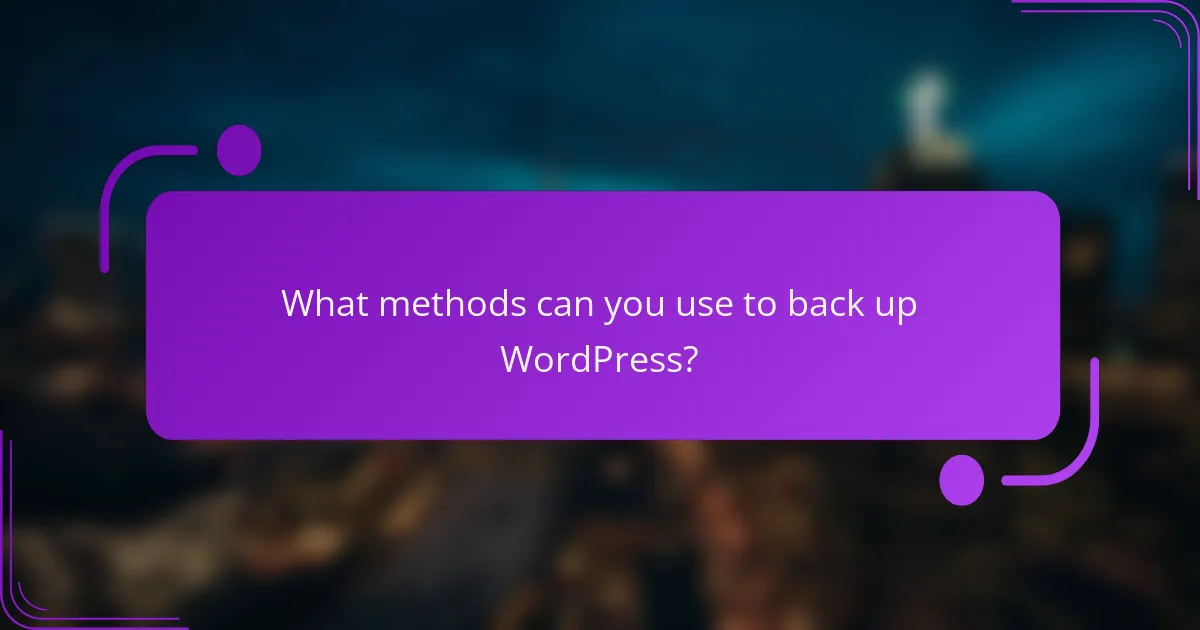
What methods can you use to back up WordPress?
There are several effective methods to back up your WordPress site, including manual backups via cPanel, using plugins, and automated solutions through hosting providers. Each method has its own advantages and considerations, allowing you to choose one that fits your needs and technical comfort level.
Manual backups via cPanel
Manual backups using cPanel involve downloading your website files and database directly from your hosting account. This method gives you complete control over what gets backed up, but it requires some technical knowledge.
To perform a manual backup, log into your cPanel account, navigate to the File Manager to compress your website files, and use phpMyAdmin to export your database. Store these files securely on your local machine or an external drive.
Remember to perform manual backups regularly, especially before making significant changes to your site, such as updates or new installations.
Using plugins like UpdraftPlus
Plugins like UpdraftPlus simplify the backup process by automating it and providing user-friendly interfaces. These plugins can back up your entire site, including files and databases, with just a few clicks.
With UpdraftPlus, you can schedule backups to run daily, weekly, or monthly, and choose where to store them, such as in cloud services like Google Drive or Dropbox. This method is ideal for users who prefer a hands-off approach.
However, ensure you regularly check that backups are completed successfully and that you can restore them if needed.
Automated backups with hosting providers
Many hosting providers offer automated backup solutions as part of their service packages. This method is convenient because backups are handled without any action required from you.
Check with your hosting provider to understand their backup frequency, retention policy, and restoration process. Some providers may offer daily backups, while others might do it weekly or bi-weekly.
While automated backups are convenient, it’s wise to have an additional backup method in place, as relying solely on your host can be risky if there are issues with their service.
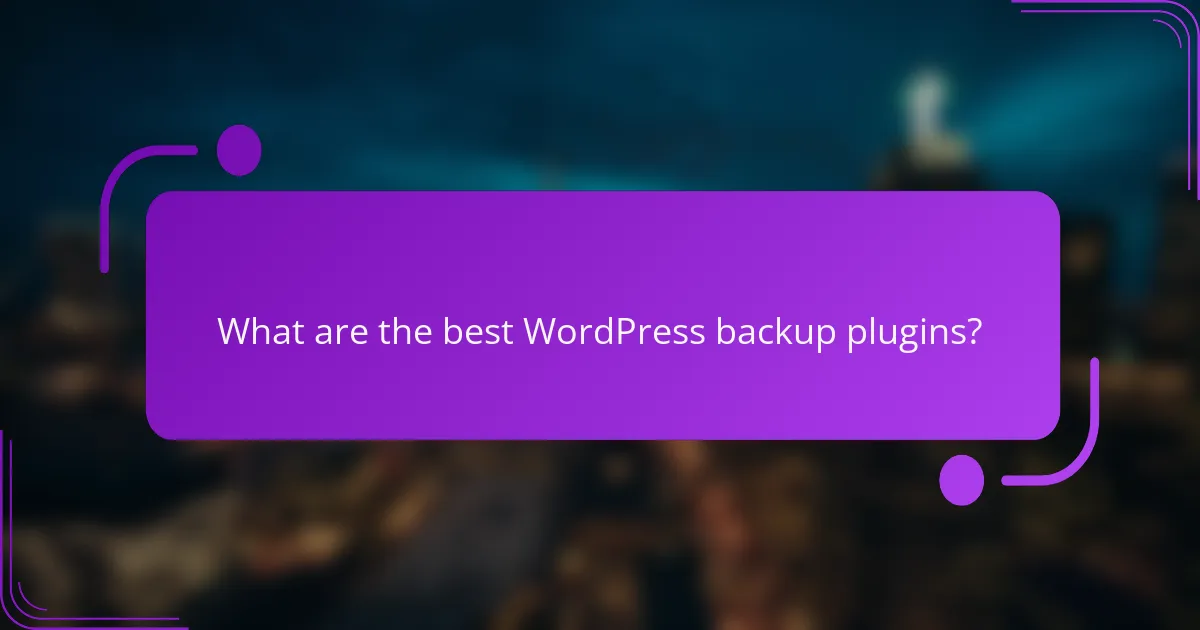
What are the best WordPress backup plugins?
The best WordPress backup plugins offer reliable solutions to secure your website’s data, ensuring easy restoration in case of issues. Key factors to consider include ease of use, storage options, and frequency of backups.
UpdraftPlus
UpdraftPlus is a popular choice for WordPress backups, known for its user-friendly interface and flexibility. It allows you to schedule automatic backups and store them in various locations, including cloud services like Google Drive and Dropbox.
This plugin supports both full and incremental backups, meaning you can save time and storage by only backing up changes. Users appreciate its restore feature, which simplifies the recovery process when needed.
BackupBuddy
BackupBuddy is a premium plugin that offers comprehensive backup solutions for WordPress sites. It features scheduled backups, remote storage options, and a straightforward restore process, making it suitable for both beginners and advanced users.
One of its standout features is the ability to migrate your site easily. However, as a paid plugin, it requires an upfront investment, which may be a consideration for smaller websites.
VaultPress
VaultPress, now part of Jetpack, provides real-time backups and security scanning for WordPress sites. This plugin is particularly beneficial for those who want continuous protection against data loss and security threats.
With VaultPress, you can restore your site with just a few clicks, and it integrates seamlessly with the Jetpack ecosystem. However, it operates on a subscription model, which may be a factor for budget-conscious users.
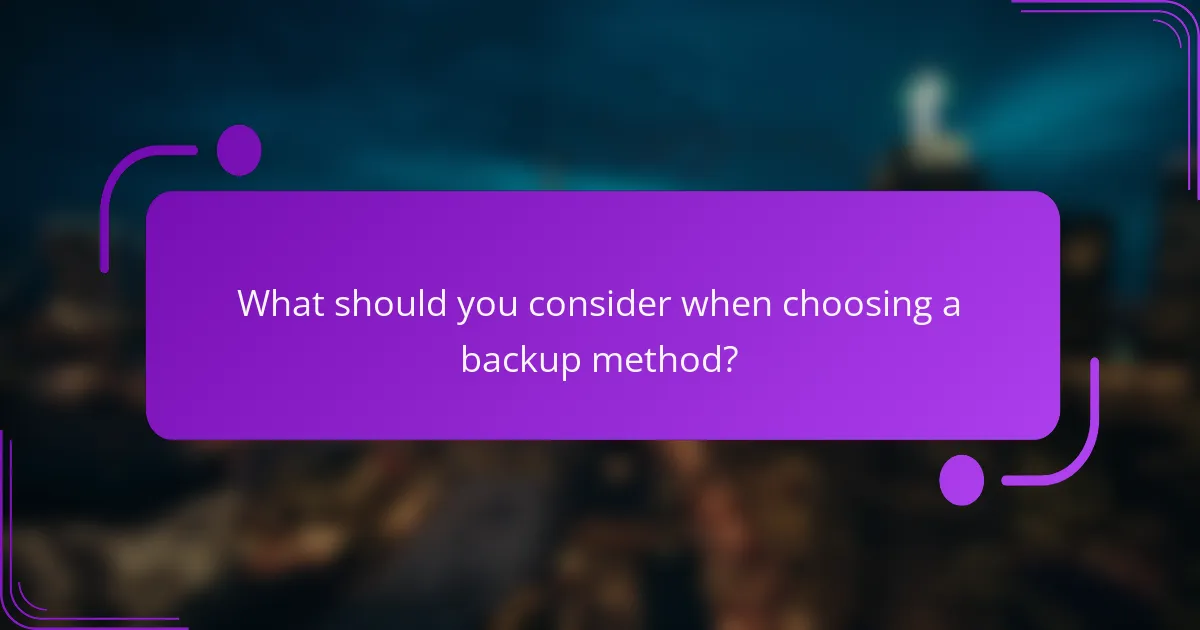
What should you consider when choosing a backup method?
When selecting a backup method for your WordPress site, consider factors such as site size, complexity, and how frequently you update content. These elements will influence the type of backup solution that best meets your needs, ensuring data security and ease of restoration.
Site size and complexity
The size and complexity of your WordPress site play a crucial role in determining the appropriate backup method. Larger sites with numerous pages, posts, and media files may require more robust solutions, such as incremental backups or cloud storage options, to efficiently manage data. For simpler sites, basic backup plugins or manual methods might suffice.
Consider the database size as well; a larger database may necessitate more frequent backups to avoid data loss. Evaluate your site’s architecture and the potential impact of downtime to choose a method that aligns with your operational needs.
Frequency of updates
Your site’s update frequency significantly influences how often you should back up your data. If you regularly add new content, plugins, or themes, aim for daily or weekly backups to minimize the risk of losing recent changes. For sites with infrequent updates, monthly backups may be adequate.
Implementing automated backup solutions can help maintain consistency in your backup schedule. Additionally, consider retaining multiple backup versions to safeguard against potential issues arising from recent updates or changes.
